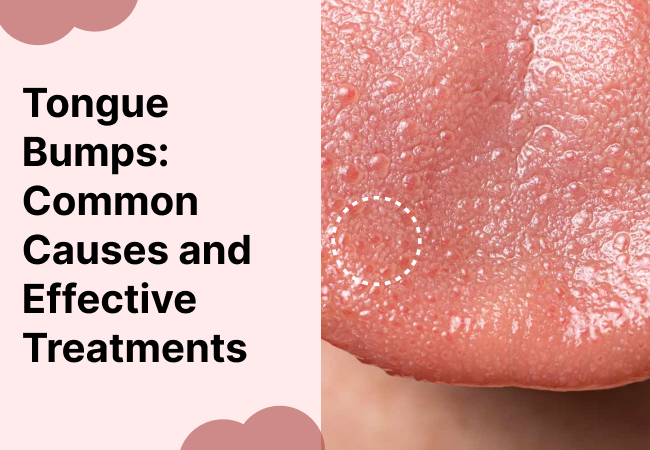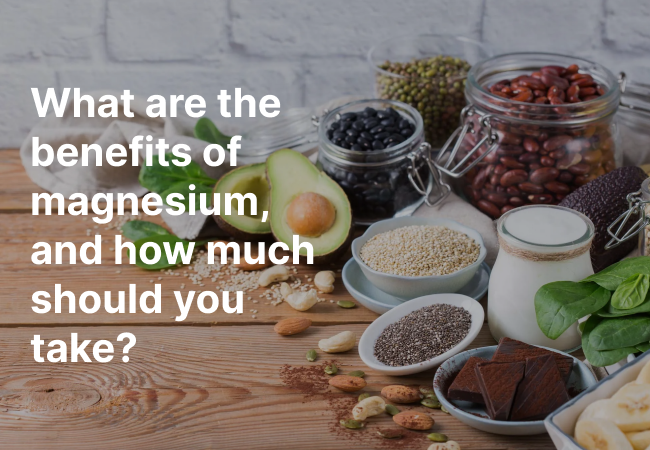Tongue Bumps: Common Causes and Effective Treatments
Ever notice small bumps on your tongue and wonder what caused them? Don’t worry — you’re not alone. Tongue bumps are common and often harmless. But sometimes, they can signal something more serious, like an infection, allergy, or injury that needs attention.
Let’s break it down in simple terms.
What Are Tongue Bumps?
Your tongue naturally has tiny bumps called taste buds. They help you sense sweet, sour, salty, and bitter flavours. These taste buds on the tongue are present from birth and play a key role in your sense of taste.
However, if you notice sudden tongue bumps or areas that look swollen, irritated, or painful, it may not just be your typical taste buds. Something else could be going on.
Causes of Tongue Bumps: What Those Bumps on Your Tongue Really Mean
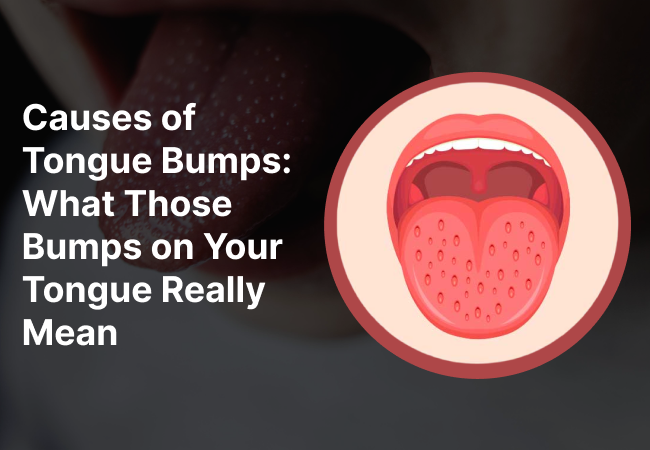
Noticed bumps on your tongue or bumps on the back of your tongue that weren’t there before? Don’t panic — most are harmless and temporary. But sometimes, a bump on the tongue can signal an infection, allergy, or another health concern that needs attention.
Let’s break down the causes of tongue bumps, what they mean, and when to see a doctor.
1. Tongue Injuries
One of the most common causes of tongue bumps is a simple tongue injury. The tongue is sensitive and reacts quickly to any irritation or trauma.
Biting your tongue, eating very hot food, or burning it with coffee can lead to tongue swelling or a painful bump on the tongue. Just like a bruise on your skin, the tongue may swell as part of the healing process.
These bumps usually fade within a few days. To speed healing, avoid spicy food, brush gently, and keep up with good oral hygiene.
2. Oral Herpes (HSV-1)
Oral herpes is caused by the herpes simplex virus (HSV-1). It often leads to cold sores around the lips, but it can also cause mouth blisters or tongue blisters.
In some cases, the virus creates painful tongue bumps that last for two to three weeks. The infection spreads through close contact, such as kissing or sharing utensils.
There’s no cure, but antiviral medication helps reduce symptoms and prevent outbreaks. Keeping your lips and mouth clean and avoiding direct contact during flare-ups can lower the risk of spreading the virus.
3. Canker Sores (Aphthous Ulcers)
Canker sores, also called aphthous ulcers, are small, round, white or yellow sores on the tongue or inside the mouth. They’re pretty painful but not contagious.
The exact cause isn’t known, but common triggers include:
- Stress
- Smoking
- Minor injuries
- Vitamin deficiencies, such as iron, folic acid, or vitamin B12 deficiency
These painful tongue bumps often heal naturally within 1–2 weeks. If the pain worsens, consult a doctor for treatment of tongue bumps. Using mouth rinses and eating soft foods can ease the discomfort.
4. Allergies
Allergic reactions can cause bumps on the back of the tongue or make your entire tongue swell. This happens when your immune system reacts strongly to certain foods, medications, or oral care products.
In mild cases, you may notice tongue irritation or minor bumps. But in severe cases, sudden tongue swelling can signal anaphylaxis — a life-threatening emergency.
Get medical help immediately if you:
- Have swelling in your lips, mouth, or tongue
- Develop a rash or hives
- Experience breathing difficulties or wheezing
Fast treatment is critical in these cases. Avoid the allergen and seek immediate medical treatment for tongue bumps caused by allergic reactions.
5. Bacterial Infections
Certain bacterial infections can cause tongue bumps, pain, and swelling. Common examples include:
- Syphilis
- Scarlet fever
- Tuberculosis (TB)
These infections may cause fever and tongue bumps or even a painful tongue infection. If you have severe pain or fever, see a doctor right away.
Most bacterial infections need antibiotics for a tongue infection. Following the full treatment course and maintaining oral hygiene helps you recover faster.
6. Transient Lingual Papillitis (Lie Bump)
If you’ve ever noticed a tiny, sore bump on your tongue that appeared suddenly, you’ve likely experienced transient lingual papillitis, also known as a lie bump.
It occurs when the tongue’s papillae — those small, raised taste buds — become inflamed. These bumps on the back of the tongue or tip can be tender or irritated.
Common triggers include:
- Hormone fluctuations
- Stress
- Certain foods
- Gastrointestinal issues
These Stress bumps on the tongue are temporary and usually heal on their own in a day or two. Avoid spicy foods, maintain tongue care, and drink water to help calm the irritation.
7. Cancer
Though rare, tongue cancer can also cause bumps on the tongue that don’t heal. It’s important not to ignore any lump on the tongue or mouth sores that are not healing.
Early signs of cancerous tongue bump include:
- Red or white patches on the tongue
- Swelling, pain, or bleeding
- Difficulty moving the jaw or swallowing
- Feeling something stuck in the throat
- Hoarse voice or ear pain
If you have a bump on your tongue lasting more than two weeks, visit a doctor for tongue issues immediately. Early diagnosis makes treatment more effective.
Diagnosing the Cause of Tongue Bumps
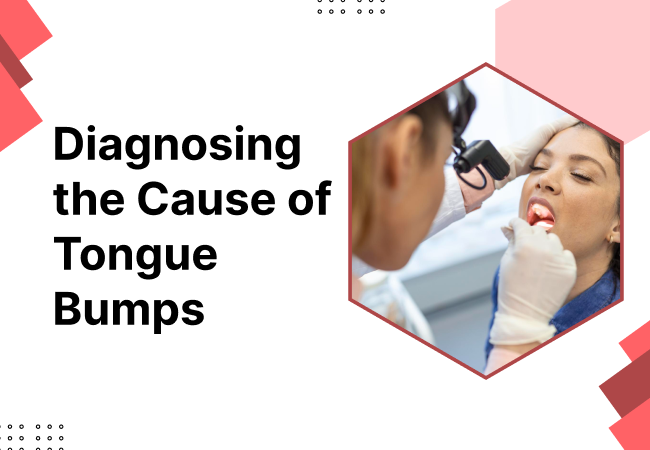
When you notice a bump on your tongue or bumps on the back of your tongue, it’s natural to worry. Most of the time, these bumps are harmless. But sometimes, they can signal an underlying issue that needs medical care. That’s where properly diagnosing tongue bumps becomes essential.
1. Physical Examination
The first step is a tongue examination. Your doctor for tongue bumps will carefully check the tongue’s surface, colour, and texture. They’ll look for signs of tongue swelling, inflammation, or infection that could explain the discomfort.
A detailed oral examination helps rule out simple causes like tongue irritation, minor injuries, or food allergies. It also helps spot more serious problems early.
2. Reviewing Medical History
Next comes your medical history. Your doctor may ask about recent illnesses, food allergies, or tongue injuries. They might also check for vitamin deficiencies that could lead to painful tongue bumps or a swollen tongue.
Understanding your history helps the doctor narrow down the possible causes of tongue bumps and plan further tests if needed.
3. Diagnostic Tests
If the cause isn’t clear, your doctor may suggest a few medical tests for tongue bumps, such as:
- Blood tests to detect infections like syphilis or tuberculosis (TB)
- A biopsy is performed if they suspect tongue cancer or another serious condition
- Tests for oral infections or allergic reactions that cause swelling
These steps help ensure an accurate tongue bumps diagnosis and the right treatment plan.
Tips to Prevent and Manage Tongue Bumps Effectively
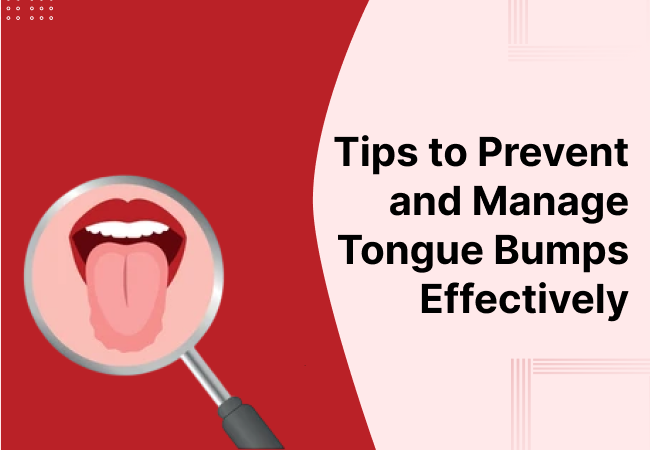
Taking care of your tongue health is essential. Bumps on the tongue or a bump on the tongue can cause discomfort and sometimes signal underlying problems. Here are practical tips to prevent tongue bumps and manage them naturally.
1. Practice Good Oral Hygiene
Maintaining good oral hygiene is the first step in preventing bumps on the tongue. Brush your teeth twice daily and floss regularly. Gently brush your tongue or use a tongue scraper to remove bacteria buildup on the tongue surfaces. This keeps your mouth clean without causing tongue irritation.
A soft-bristled toothbrush is ideal to avoid further damage to your tongue’s delicate surface. Proper cleaning helps prevent oral health concerns like infections and swelling.
2. Stay Hydrated
Dehydration can cause a dry mouth, which increases the risk of tongue irritation and bumps. Drinking enough water keeps your mouth moist and reduces bacterial growth. Hydration also helps soothe tongue bumps naturally.
Try to drink at least 6–8 glasses of water daily. Staying hydrated supports your tongue care and the prevention of future bumps.
3. Avoid Tobacco and Excessive Alcohol
Both tobacco and alcohol irritate the tongue and may cause bumps on the tongue or even more serious oral health issues. Long-term use can cause tongue lesions or inflammation.
Quitting tobacco and limiting alcohol improves tongue health and overall well-being. These changes help you reduce the risk of persistent tongue bumps and oral infections.
4. Watch Your Diet
What you eat can affect your tongue. Spicy foods, tongue irritation, acidic foods, tongue sensitivity, and hot foods may trigger or worsen bumps on the back of the tongue.
If certain foods cause discomfort, limit them. Being mindful of your diet is an essential step to getting rid of bumps on the tongue naturally. Avoiding irritants supports long-term tongue care and prevention.
5. Limit Sugary and Acidic Foods
High-sugar and acidic foods feed bacteria and yeast, leading to conditions like oral thrush or canker sores. Both can cause spots on the tongue or painful bumps.
Cutting down on sodas, candies, and citrus drinks helps reduce these risks. Maintaining a balanced diet is essential for tongue health and overall oral hygiene.
6. Manage Stress
Stress weakens immunity, making you more vulnerable to oral problems. It can trigger habits like teeth grinding or cheek biting, which cause tongue injury and bumps.
Incorporate stress management techniques such as yoga for Stress, meditation for oral health, or deep breathing. These not only improve mental health but also protect your mouth health.
7. Protect Your Tongue from Trauma
Accidental biting, chewing sharp foods, or eating quickly can cause tongue cuts or bumps. This can result in a painful bump on the tongue or bumps on the back of the tongue.
Be mindful while eating and avoid chewing hard or sharp objects. Protection against trauma is a simple yet effective tongue care tip.
8. Care for Dentures Properly
If you wear dentures, ensure they fit well and stay clean. Ill-fitting dentures or dirty dentures can rub against your tongue, causing irritation and bumps.
Cleaning dentures daily and checking their fit helps prevent tongue swelling or persistent tongue bumps. Good denture care is vital for oral hygiene routine and long-term mouth health.
9. Schedule Regular Dental Checkups
Regular dentist visits are essential for the prevention of bumps on the tongue. Dentists can spot early signs of tongue irritation, infection, or lesions.
Routine dental exams help in diagnosing tongue bumps early. This ensures timely treatment for tongue bumps and supports ongoing tongue care and prevention.
10. Seek Professional Help When Needed
Most tongue bumps go away naturally. But if you notice a persistent bump on the tongue or bumps on the back of the tongue that don’t improve, see a dentist.
A professional can diagnose tongue bumps accurately and suggest effective treatments. Early intervention prevents complications and keeps your oral health maintenance on track.
Frequently Asked Questions About Tongue Bumps
Here are some frequently asked questions about tongue bumps people often have. This guide will answer them clearly to help you understand your condition and maintain tongue health.
1. Is It Common to Have Bumps on the Tongue?
Yes. Taste buds on the tongue are natural bumps present from birth. They give your tongue its texture. Having some bumps is normal.
However, changes in tongue bumps or a bump on the tongue that appears suddenly could signal an underlying condition. These changes should get medical attention, including tongue bumps, to rule out infections or other health concerns.
2. What Viruses Cause Bumps on the Tongue?
Certain viruses can cause bumps on the tongue or tongue lesions. Common ones include:
- HPV tongue bumps (Human Papillomavirus)
- Syphilis tongue bumps
- Oral herpes tongue bumps (HSV-1 virus)
If a virus is suspected, your doctor can perform tests to diagnose tongue bumps and provide the proper treatment.
3. Is Transient Lingual Papillitis a Sexually Transmitted Illness (STI)?
No. Transient lingual papillitis, also called lie bumps, is not caused by a pathogen. It is not an STI and cannot be transmitted sexually.
This is a mild condition often linked to irritation, stress, or minor injury. Such a bump on the tongue usually goes away within a few days without treatment.
4. What Causes Swollen Bumps on the Back of the Tongue?
Bumps on the back of the tongue are often caused by a tongue injury, such as biting your tongue accidentally or eating hot or sharp foods.
Other causes include irritation from dental appliances or infections. If the swelling doesn’t go down or you notice other symptoms, consult a doctor for tongue bumps to rule out more serious causes.
Takeaway
Bumps on the tongue are common. Some go unnoticed, while others grow and cause discomfort or irritation.
Most tongue lesions are benign, but a bump on the tongue or a bump on the back of the tongue that changes in size or persists should be checked by a doctor. A doctor for tongue bumps can diagnose tongue bumps and suggest the best treatment for the tongue.
With proper tongue care tips, regular checkups, and attention to changes, you can maintain good oral health and prevent many causes of tongue bumps.
Popular Post
Recent Post
How much protein does your body really need each day?
Protein: The Building Block of Life Proteins are the essential building blocks that make up your body. They help you grow, repair, and stay strong. Every part of your body—muscles, tendons, organs, and skin—relies on protein. But protein does more than build your body. It also helps create enzymes, hormones, and neurotransmitters—tiny molecules that keep […]
Tongue Bumps: Common Causes and Effective Treatments
Ever notice small bumps on your tongue and wonder what caused them? Don’t worry — you’re not alone. Tongue bumps are common and often harmless. But sometimes, they can signal something more serious, like an infection, allergy, or injury that needs attention. Let’s break it down in simple terms. What Are Tongue Bumps? Your tongue […]
What are the benefits of magnesium, and how much should you take?
In the world of nutrients, vitamins, and supplements, magnesium is finally getting the attention it deserves. For years, it’s been the unsung hero of good health — overlooked, underappreciated, and often forgotten. But that’s changing. Today, more people are learning just how vital magnesium for health really is. From better sleep to stronger bones, the […]
